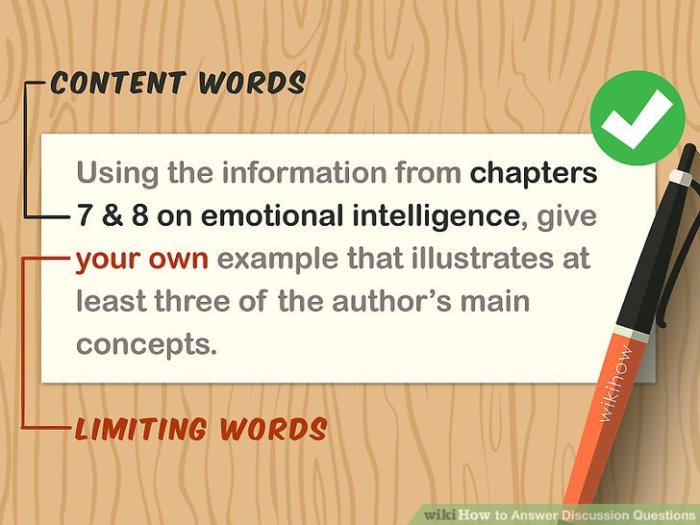Start with why discussion questions – In the realm of effective communication, “start with why” discussion questions hold a pivotal position. By delving into the underlying motivations and purposes, these questions ignite a transformative journey that empowers decision-making, fosters innovation, and cultivates a deeper understanding of complex issues.
Throughout this comprehensive guide, we will explore the significance, benefits, and challenges associated with “start with why” discussions. We will delve into practical methods for facilitating these discussions and showcase diverse applications across various industries and fields.
Start with Why Discussion Questions

Understanding the underlying motivations behind actions and decisions is crucial for effective communication and problem-solving. “Start with why” discussion questions encourage participants to delve into the purpose and rationale behind their ideas, fostering a deeper understanding and leading to more informed outcomes.
Purpose of ‘Start with Why’ Discussion Questions
The purpose of “start with why” discussion questions is to uncover the underlying reasons and motivations that drive actions and decisions. By understanding the “why,” individuals can better evaluate the validity of their ideas, identify potential obstacles, and develop more effective solutions.
Benefits of ‘Start with Why’ Discussions
- Improved decision-making: Understanding the underlying motivations behind decisions helps individuals make more informed choices that align with their values and goals.
- Enhanced innovation and creativity: Exploring the “why” encourages participants to think outside the box and challenge assumptions, leading to innovative solutions.
- Increased collaboration and understanding: By understanding each other’s motivations, participants can build stronger relationships and collaborate more effectively.
Challenges of ‘Start with Why’ Discussions, Start with why discussion questions
- Resistance to change: Individuals may be resistant to exploring their motivations, especially if they challenge existing beliefs or practices.
- Time constraints: Engaging in “start with why” discussions can be time-consuming, especially in fast-paced environments.
- Lack of facilitation skills: Facilitators need to be skilled in asking probing questions and creating a safe space for open dialogue.
Methods for Facilitating ‘Start with Why’ Discussions
- Create a supportive environment: Establish a safe and respectful space where participants feel comfortable sharing their thoughts and ideas.
- Use open-ended questions: Ask questions that encourage participants to explore their motivations and reasons for their beliefs and actions.
- Listen actively: Pay attention to both verbal and non-verbal cues to understand the underlying motivations of participants.
- Challenge assumptions: Encourage participants to question their own assumptions and consider alternative perspectives.
- Summarize and reflect: Periodically summarize the key points of the discussion to ensure understanding and identify areas for further exploration.
Applications of ‘Start with Why’ Discussions
“Start with why” discussion questions can be applied in a wide range of contexts, including:
- Business strategy and planning
- Team building and collaboration
- Conflict resolution
- Personal development and goal setting
- Education and training
Examples of ‘Start with Why’ Discussion Questions
- Why is this project important to you?
- What are your underlying assumptions about this situation?
- What are the core values that drive your decision-making process?
- How does this decision align with your long-term goals?
- What are the potential risks and benefits of this approach?
Query Resolution: Start With Why Discussion Questions
What is the purpose of “start with why” discussion questions?
These questions aim to uncover the underlying motivations, beliefs, and values that drive actions and decisions.
How do “start with why” discussions benefit decision-making?
They provide a clearer understanding of the rationale behind decisions, enabling more informed and purposeful choices.
What are some common challenges associated with “start with why” discussions?
Resistance to introspection, discomfort with vulnerability, and difficulty in articulating motivations.


